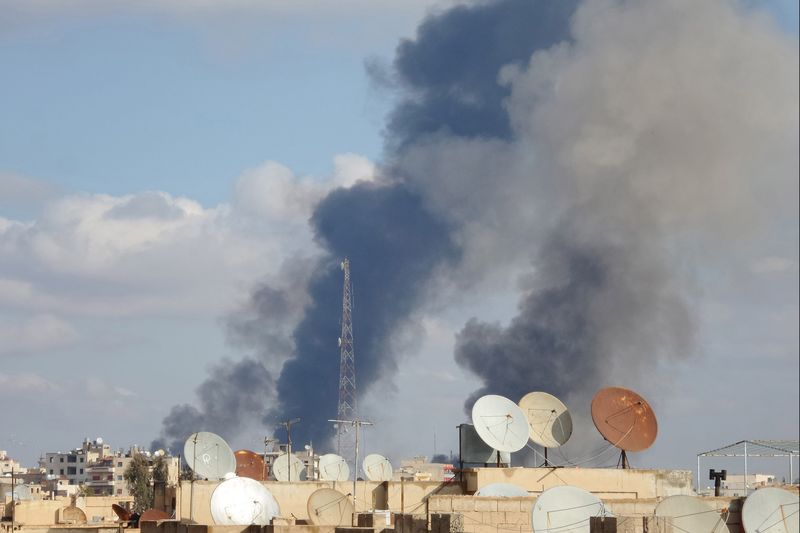By Jonny Hogg
IZMIR, Turkey (Reuters) - NATO is not considering establishing a "no-fly zone" in northern Syria, something Turkey has been calling for to alleviate security and humanitarian pressures on its southeastern borders, one of the alliance's top generals has told Reuters.
Turkey has NATO's second largest military and is host for Land Command (LANDCOM), which is charged with improving the effectiveness and response time of the alliance's land forces.
Although Turkey has made no formal request to NATO for help in establishing a no-fly zone, it has repeatedly said that willing nations should put one in place to create safe areas in Syria, allowing some of an estimated 1.6 million Syrian refugees to be repatriated.
"A no-fly zone is a resource intensive undertaking," Lieutenant General John Nicholson, the new head of LANDCOM, told Reuters in an interview at his headquarters in the Turkish coastal city of Izmir.
The recent example of Libya emphasized how much work was required for NATO to run air operations, according to Nicholson.
"But that's not something we're looking at right now in this context," he said.
Ankara's plans for establishing so-called "safe zones", with air defense as a key component, have so far received a cool reception from allies. Military experts point out it would necessitate either agreement from the Syrian government or taking out Damascus' advanced air defense systems.
Such a move would risk dragging western powers further into Syria's three-year-old war, and enrage President Bashar al-Assad's allies, Russia and Iran.
Complicating matters, Assad is using U.S. air strikes as cover for his own air campaign against Syrian rebels, hitting the Islamic State stronghold of Raqqa in retaliation for the group's killing of Syrian soldiers.
Disagreement over a no-fly zone is part of wider divisions between Turkey and its western allies over how to tackle the instability sweeping the Middle East.
Turkey wants its enemy Assad removed from power, and believes focusing on the radical Sunni Islamic State group is treating the symptoms rather than the disease, namely lawlessness and brutality inside the power vacuum of today's Syria.
A recent visit to Turkey by U.S. Vice President Joe Biden saw both sides keen to highlight their points of agreement, but there was little sign of any major policy shifts.
Disquiet over the direction of U.S. policy in Syria is being seen as a key factor in the abrupt departure this week of the U.S. Defense Secretary Chuck Hagel, who had apparently become increasingly frustrated with a lack of strategy.
Despite widespread criticism, including from Ankara, that the current plan of air strikes and support for opposition groups falls far short of what is required, there is little appetite in western capitals for a more direct role in the Syrian conflict.
NATO is monitoring events in the Middle East, but is making no plans to play an active role there, Nicholson said.
"I'm confident having fought in a counter-insurgency (in Afghanistan) for years and studying this threat to the south that NATO would be more than capable of handling it ... (But) we only make plans at the request of our member states and that's not something we're working on right now."
EXPEDITIONARY FORCE
Nicholson says the focus of the alliance is on adapting to the end of its active military role in Afghanistan next month.
One of the longest combat commitments in recent military history, the Afghan war honed NATO's skills in tackling counter-insurgencies.
Now, the emphasis is changing to a more expeditionary style force, able to deploy quickly to tackle potential threats, including along NATO's eastern border with Russia, Nicholson said.
"You may not know where you're going to fight or when you're going to fight. Therefore you need to focus on your readiness, being ready to fight sooner rather than later. Days rather than weeks," said Nicholson, who took over his post a month ago.
A key component will be the establishment of a Very High Readiness Joint Taskforce (VJTF), details of which are expected in the coming weeks, according to Nicholson.
Work is also underway to adapt NATO to tackle so-called "hybrid warfare", a label attached to recent Russian tactics in Ukraine, seen as a combination of aggression, propaganda, provocation and stirring up local actors.
NATO is also planning some of its most extensive exercises since the end of the Cold War, focused on honing the alliance's ability to defend its borders.
Speeding up NATO's response time and developing specialist knowledge to tackle specific threats -- anything from cyber warfare to high end air defense -- will be key to the alliance remaining the most capable in the world, Nicholson believes.
(Reporting by Jonny Hogg; Editing by Giles Elgood)
